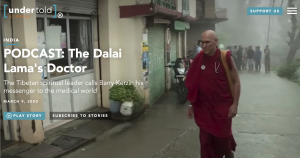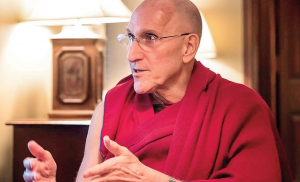Mayor William Peduto and Dr. Barry Kerzin on Friday announced that the Altruism in Medicine Institute (AIMI) is basing its headquarters in Pittsburgh.
Read full article in the PITTSBURGH POST-GAZETTE
Mayor William Peduto and Dr. Barry Kerzin on Friday announced that the Altruism in Medicine Institute (AIMI) is basing its headquarters in Pittsburgh.
Read full article in the PITTSBURGH POST-GAZETTE
Powerful and deeply moving article by Donald M. Berwick, MD, with the commentary Compassion-Driven 6 Action Items in Donald Berwick’s Visionary Article are Doable by AIMI founder Barry Kerzin, MD.
We often “take on” or “own” the pain of others, which can be overwhelming and lead to burn out. Especially in today’s time of the Covid-19 pandemic, when we see so much suffering around us, there are ways we can have a broader perspective of the situation; to have clarity of mind to make better decisions.
Compassion is the wish and action, when we are able, of reducing suffering. There is compassion for others, as well as compassion for ourselves. When we shift from empathy to compassion, emotionally we can see the situation more fully with an eye on what we can do to help.
During this interactive session, organised by Synergos, Dr. Kerzin asked the group to explore the journey towards compassion.

An interview for Stanford Radio Station KZSU-90.1 FM www.modernteknews.com withDr. Barry Kerzin, from Dharmsala in April 2020, to share HH The Dalai Lama’s message of using Compassion to help deal with the 2020 pandemic. Dr. Kerzin shared his advice on how to cope in these trying times, and discussed some of the Compassion programs that his Altruism in Medicine Institute teaches around the world to physicians, nurses, teachers, as well as the police force in Pittsburgh, PA, and other groups. The interview was conducted by Ms. Labiba Boyd.
Powerful and deeply moving article by George Gubernikoff, MD, with the commentary Beyond Empathy to Compassion by AIMI founder Barry Kerzin, MD. The article and its commentary highlight the empathy and often ensuing burnout dilemma that many healthcare professionals find themselves in.
A very timely piece written by AIMI board member Garrett Riggs, MD, PhD.
Most people think of philosophy — to the extent they think about it at all — as an intellectual, academic field with little practical application.
Coronavirus is about to change that. If the worst predictions about the pandemic become reality, Americans in particular are going to have an abrupt encounter with difficult choices that philosophers have been thinking about for centuries.
The decisions we may face already provoke great uncertainty, and as a species, we humans do not tolerate uncertainty well. It is sometimes helpful if we can at least articulate the source of our anxiety in order to discuss it. This is one area where philosophy can help give a name to what we are feeling.
This essay is not a scholarly article, nor is it really an article on ethics or philosophy. It is a brief review of some core concepts in medical ethics, and an introduction to the names of the conflicts we may soon face.

The Tibetan spiritual leader now calls Kerzin, a tall, white California native, his messenger to the medical world – a journey that took a classically trained Western doctor halfway across the globe to become a buddhist monk.
As many as half of all clinicians suffer from the problem, creating risks to patients, malpractice claims and absenteeism, study finds.
.

Pittsburgh Quarterly Editor Douglas Heuck spoke briefly last week with Dr. Kerzin about the significance of the holiday season.
photo credit: Renee Rosensteel
A moving anecdote by a physician, on the horror and senselessness of gun violence, and the need for us to do something about it, as medical professionals and citizens.